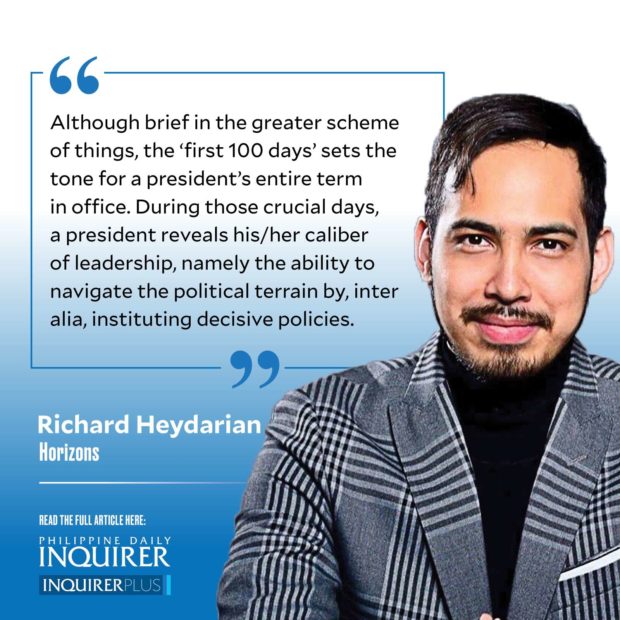Marcos Jr.: First 100 days
 The political obsession with the “the 100-days” tradition can be traced to the French concept of “Cent Jours” (Hundred Days), which referred to the crucial period between Napoleon Bonaparte’s triumphant return to Paris from exile in 1815 and, just over three months later, his decisive defeat in the Battle of Waterloo, which restored the Bourbon monarchy to power.
The political obsession with the “the 100-days” tradition can be traced to the French concept of “Cent Jours” (Hundred Days), which referred to the crucial period between Napoleon Bonaparte’s triumphant return to Paris from exile in 1815 and, just over three months later, his decisive defeat in the Battle of Waterloo, which restored the Bourbon monarchy to power.
In modern era, it was American President Franklin D. Roosevelt, affectionately known as FDR, who coined the term “first 100 days” during one of his famous fireside chats in July 1933.
“I am prepared under my constitutional duty to recommend the measures that a stricken nation in the midst of a stricken world may require,” declared Roosevelt upon assuming the mantle of leadership. In his first 100 days, FDR passed as many as 76 laws, which primarily focused on providing jobs and economic relief to millions of ordinary Americans struggling against the ravages of the Great Depression.
His first three months in power, marked by furious activity, served as a benchmark for all future presidents. In the case of Barack Obama, America’s first African-American leader, his first 100 days saw him visiting Turkey, Iraq, Canada, Mexico, Trinidad and Tobago, the UK, France, Germany, and the Czech Republic, amid a concerted effort to redeem US’ global leadership, after the debacles of the George W. Bush administration.
Although brief in the greater scheme of things, the “first 100 days” sets the tone for a president’s entire term in office. During those crucial days, a president reveals his/her caliber of leadership, namely the ability to navigate the political terrain by, inter alia, instituting decisive policies.
Since the Philippines’ political system has been effectively patterned after that of its former colonizer, our presidents have had to live up to similar expectations in their first 100 days in office.
Both former presidents Rodrigo Duterte and Benigno Aquino III pressed ahead with major policies right after occupying Malacañang. While the former unleashed a scorched-earth drug war to ostensibly rid the country of criminal elements, the latter launched an unprecedented anti-corruption campaign against holdovers from the Arroyo administration era.
And this, dear reader, brings us to current President Marcos Jr., who spent his first three months in office to “reintroduce” both the country and his family to the world. Despite his reputation as a laidback figure, and notwithstanding his “Grand Prix” diplomacy, the incumbent managed to introduce a number of decisive changes early on.
To begin with, he appointed veterans such as Enrique Manalo and Jose Faustino Jr. to lead key Cabinet positions, much to the disappointment of politicos who eyed the prized offices. Moreover, he swiftly revived frayed ties with traditional allies, especially the United States, through a series of high-level meetings, including with US President Joseph Biden and Secretary of State Antony Blinken. Not only were the meetings extremely cordial, but they have also paved the way for a rapid expansion in bilateral security cooperation.
Next year, the two allies are expected to conduct as many as 500 joint military exercises, more than any other alliance in the Indo-Pacific region; the annual Balikatan war games in 2023 will likely feature as many as 16,000 troops. All of a sudden, the Philippines has gone from an unruly ally with a petulant populist leader (Duterte) to a key element in Pentagon’s “integrated deterrence” strategy against China in the whole region. As Ambassador to the US Jose Romualdez emphatically put it: “[O]ur relationship with the United States is at its best right now.”
Meanwhile, Mr. Marcos has taken a far tougher stance against Beijing’s bullying in the South China Sea, suspended a number of sputtering Chinese infrastructure projects, recalibrated Duterte’s drug war in favor of a more civilized approach, and toned down all the paranoiac Red-tagging and puerile commotion about constitutional change under the previous administration.
There have been big misses too, including the non-appointment of a full-fledged health secretary. And the tragic demise of firebrand journalists such as Percival Mabasa, better known as Percy Lapid, and the continued suffering of former senator Leila de Lima on seemingly trumped-up charges, underscore Mr. Marcos’ long-term challenge, namely restoring the rule of law in the Philippines. It will be an uphill battle, even for those committed to a rules-based democracy.
rheydarian@inquirer.com.ph




















